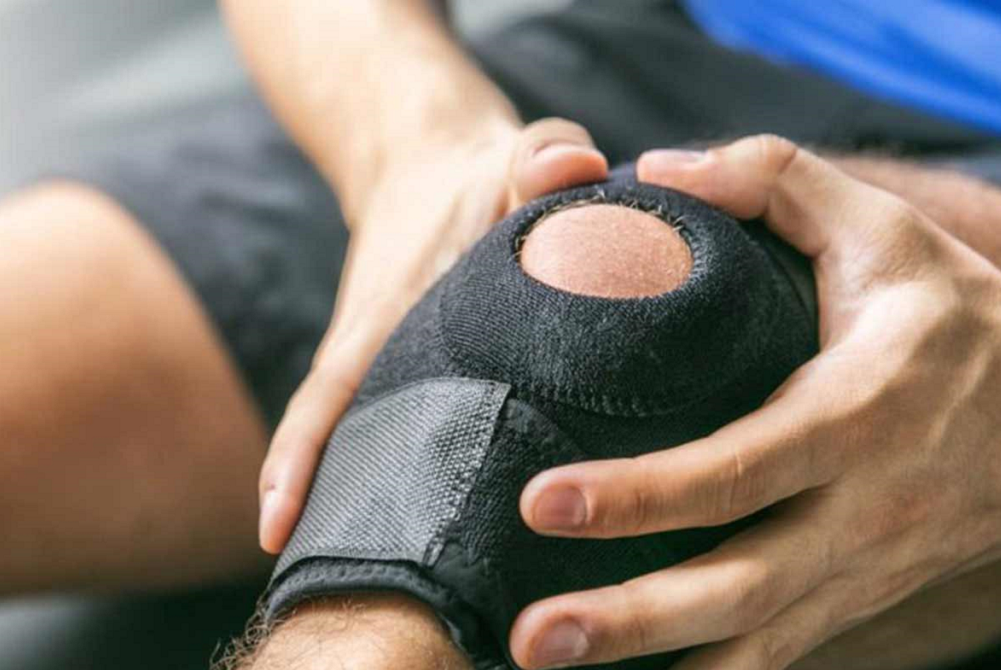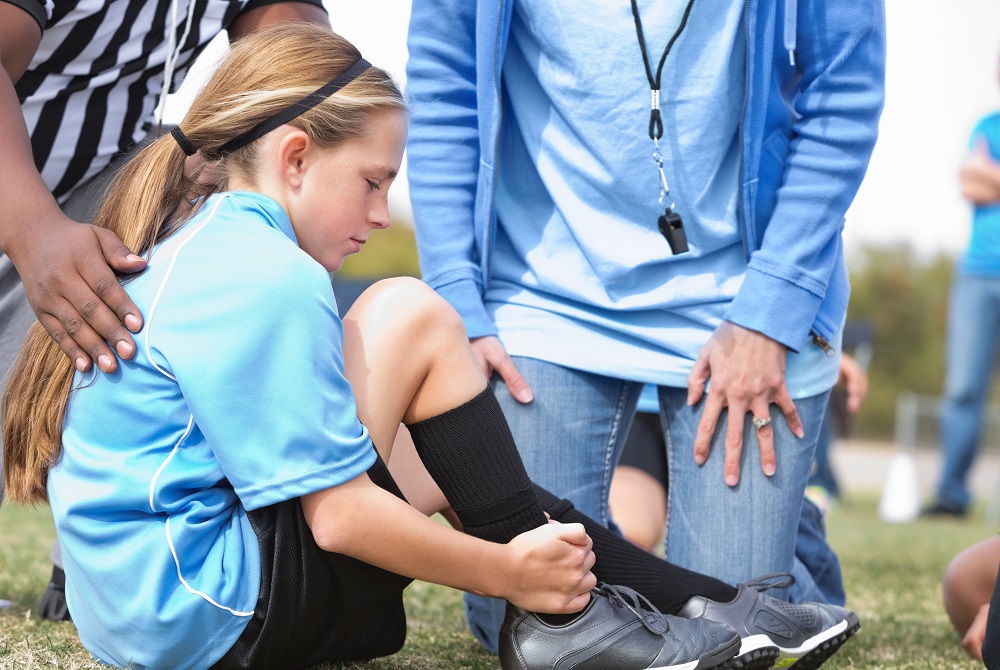
Summer Is Peak Time For Outdoor Sports Injuries
June 6, 2023
Summertime is the ideal time for outdoor activities like boating, swimming, barbecues and picnicking. It’s also ripe for sports injuries, says Nancy White, M.D., a Henry Ford Health sports medicine physician.
 “We encourage people of all ages to get outside and take advantage of all the activities available during the summer. It’s very important, though, that people keep safety top of mind to reduce their risk of injury,” Dr. White says.
“We encourage people of all ages to get outside and take advantage of all the activities available during the summer. It’s very important, though, that people keep safety top of mind to reduce their risk of injury,” Dr. White says.
Dr. White counts these as the five most common injuries:
- Sprains and strains
- Fractures
- Trampoline injuries
- Bike injuries
- Overuse injuries
“Trampoline injuries are mostly caused by jumping, either by an awkward landing or colliding with someone,” Dr. White says. “Overuse injuries happen when someone overextends themselves in a particular activity, whether it’s attending multiple sports camps or simply exercising outdoors.”
Dr. White recommends these three tips for reducing your risk of injury:
- Stay hydrated. Replenish your fluid intake with frequent water breaks.
- Perform warm-up exercises before your run or your game.
- Wear protective gear. Whether bike riding, rollerblading or skateboarding, a helmet and protective pads are a must. Obey traffic laws and store your phone away.
For soft-tissue injuries strains and sprains, Dr. White says the R.I.C.E. method is an immediate at-home treatment you can apply to reduce swelling and pain. It stands for Rest, Ice, Compression and Elevation. Over-the-counter anti-inflammatory medicine, such as ibuprofen (like Advil) or acetaminophen (like Tylenol), can help too.
If the pain worsens to the point that it interferes with your usual activities or sleep, make an appointment with your doctor or a sports medicine doctor.
Seek medical attention immediately if your pain was caused by a particularly forceful impact, you suspect a broken bone, or if the injury is accompanied by:
- Significant swelling
- Redness
- Tenderness and warmth around the joint
- Significant pain
- Fever
For injuries that don’t improve and require medical attention, visit henryford.com/sports and request an appointment with a Henry Ford sports medicine doctor.
Dr. Nancy White is a sports medicine doctor seeing patients at Henry Ford Medical Center-Columbus in Novi and at the William Clay Ford Center for Athletic Medicine in midtown Detroit.

Is My Student Athlete's Pain More Than Just Growing Pains?
July 27, 2021
There are a few factors that can make student athletes prone to injury. They might be overusing their muscles (thanks to a more rigorous exercise regimen), and they might not yet have developed the proper technique for their sport.
“These factors, combined with the fact that student athletes have growing bodies that they’re still getting used to—especially after a growth spurt — can make them more prone to injury,” says Nancy White, M.D., a sports medicine physician with Henry Ford Health System.
However, just because your child is feeling pain doesn’t necessarily mean they’ve sustained an injury. There is such a thing as growing pains, although the term may be misleading. “Most experts feel that growth itself does not cause pain,” says Dr. White. “The most likely reason for ‘growing pains’ is overuse of the muscles, causing pain and soreness after an activity.”
These growing pains typically occur at the front of the thighs, the back of the knees and the calves, she says, and occur commonly in the late afternoon, evening, or night. If your child is experiencing pain outside of these areas or times of day, it might not be growing pains — and it’s a good idea to get it checked out by a doctor.
Tell-Tale Signs That Pain Should Be Examined
If the pain goes away by the next day — if your child has rested during night and feels better the next morning — there’s no need for concern. But you should head to the doctor if:
► the pain is lingering into the next day.
► the pain is also accompanied by bruising, swelling or redness.
► the pain is so intense that they’re unable to put weight on their legs.
“In these cases, don’t wait — the longer you wait, the more dangerous the injury can become,” says Dr. White.
How Student Athletes Can Help Prevent Injuries
Encourage your child to take proper precautions and maintain healthy habits, all of which can lower the likelihood that they’ll sustain an injury. Dr. White recommends the following tips:
- Maintain proper technique. “Knowing and understanding the movements needed for whatever sport they practice is so important,” says Dr. White. “Figure skating and gymnastics are two sports where I tend to see injuries more often during growth phases. These athletes are often learning difficult skills at a time in their lives when they’re going through a growth spurt, and that combination can lead to injury.”
- Stretch before and after playing a sport. “Try dynamic stretching — where you’re actually moving while stretching — instead of static stretching, where you’re holding the stretch,” says Dr. White. “Dynamic stretching is a great warm up. It can help improve flexibility and reduce the risk of injury.”
- Strength train, especially in the core and limbs. Doing so will help create stable, strong muscles to keep the body properly aligned and lessen the chances of injury.
- Eat a balanced diet and stay hydrated. While it’s normal for kids to have sugar every once in a while, filling the bulk of their diet with plenty of water, fresh fruits and vegetables, healthy protein, fats and carbohydrates will help them function to their best ability.
- Get enough rest each night. Sleep is necessary for health and well-being in general, but when it comes to athletes, rest is incredibly important to help their bodies recuperate. In general, kids need about 10 hours of sleep per night. So if your child plays a sport, you want to really be sure that they’re hitting that 10-hour mark, says Dr. White.
Dr. Nancy White is a sports medicine physician with Henry Ford Health System. She sees patients at Henry Ford Medical Center – Columbus in Novi, and Henry Ford Medical Center — Bloomfield Township.
Want to learn more? Henry Ford Health System sports medicine experts are treating the whole athlete, in a whole new way. From nutrition to neurology, and from injury prevention to treatment of sports-related conditions, they can give your athlete a unique game plan. To find a sports medicine physician at Henry Ford, visit henryford.com or call 1-800-436-7936.


